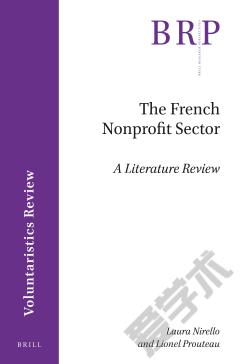The French Nonprofit Sector —— A Literature Review
----- 法国非营利部门:文献综述
This article deals with the literature on the French nonprofit sector ( NPS ). A preliminary part is devoted to presenting and discussing the characteristics that shape the approaches to this sector in France. We stress the strong influence of legal categories on the sectorâs definition and, in this context, the importance of the status inherited from the 1901 Act on contracts of association. This raises a problem for a more analytical approach to the sector, because the diversity of the nonprofit organizations ( NPO s) regulated under this Act risks being overshadowed. Indeed, not all NPO s regulated under the 1901 Act are voluntary associations as understood by English-speaking people. The largest NPO s are voluntary agencies, usually with paid staff, and lacking memberships (Smith, 2015a, 2015b). In this first part, we also underline the primacy accorded in France to the concept of the social economy, which has today become the social and solidarity economy ( SSE ), over that of the nonprofit sector. The SSE , whose recognition from the public authorities has increased over the last few decades, includes, but is not limited to, the NPS , since cooperatives and mutuals (mutual aid groups) have to be added.In the second part, the article outlines some landmarks in the history of the French NPS . French NPO s were for many years objects of suspicion, arbitrariness and repression on the part of the public authorities and this persisted until the 1901 legislation on contracts of association was enacted. However, this hostile context did not prevent the sector from having a richer existence than is sometimes admitted. The 1901 Act marked a very significant moment in the history of the French NPS , since it finally enshrined freedom of association in French law. Although the history of the French NPS since this Act is yet to be written, our literature review highlights some aspects of its contemporary development and it addresses a topic that merits particular attention in Franceânamely the interpenetration between certain NPO s and the public authorities. Indeed, such an interpenetration may affect the autonomy of the former by rendering them instruments of the latter. The fear of an instrumentalization by government is a recurring problem among NPO s.This literature review also focuses on empirical studies of the sector, placing a particular emphasis on the more recent ones. These French studies basically adopt two types of approach. The first is concerned essentially with the NPO s and focuses its attention on their economic importance, whether measured in terms of financial resources, employment, or, less frequently, added value. This is undoubtedly the dominant approach in the literature on the subject. In doing so, a great deal of emphasis is placed on large organizations. Voluntary associations managed solely by volunteers are treated as insignificant and the less formal part of the NPS is unaddressed. The second approach investigates the kinds of individual participation the sector engenders by examining the various forms it takes, such as membership of NPO s or voluntary work. In this respect, research shows a relative stability of association membership over the past three decades but volunteering is still only partially documented, as are cash donations.This review ends with the analysis of the challenges that NPS faces in a context characterized by the increasing constraints on public funding, changes in the nature of such funding with a substitution of contracts for subsidies, an increased competition among NPO s as well as between NPO s and for-profit enterprises. Such a context has forced NPO s to increase their degree of organizational professionalization and certain NPO s increasingly use management instruments applied in for-profit enterprises. This raises questions about their specificities and their raison dâetre , and these questions lead researchers to pay more attention to the governance systems of NPO s. The article concludes that, despite the advances in research on the French NPS , some aspectsâlike formal volunteering and the role of voluntary associationsâare still understudied, while othersâlike informal groups and informal volunteeringâare almost totally ignored.
{{comment.content}}








 京公网安备 11010802027623号
京公网安备 11010802027623号